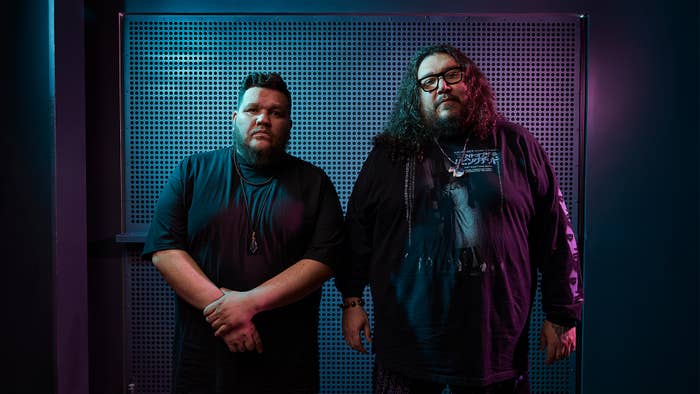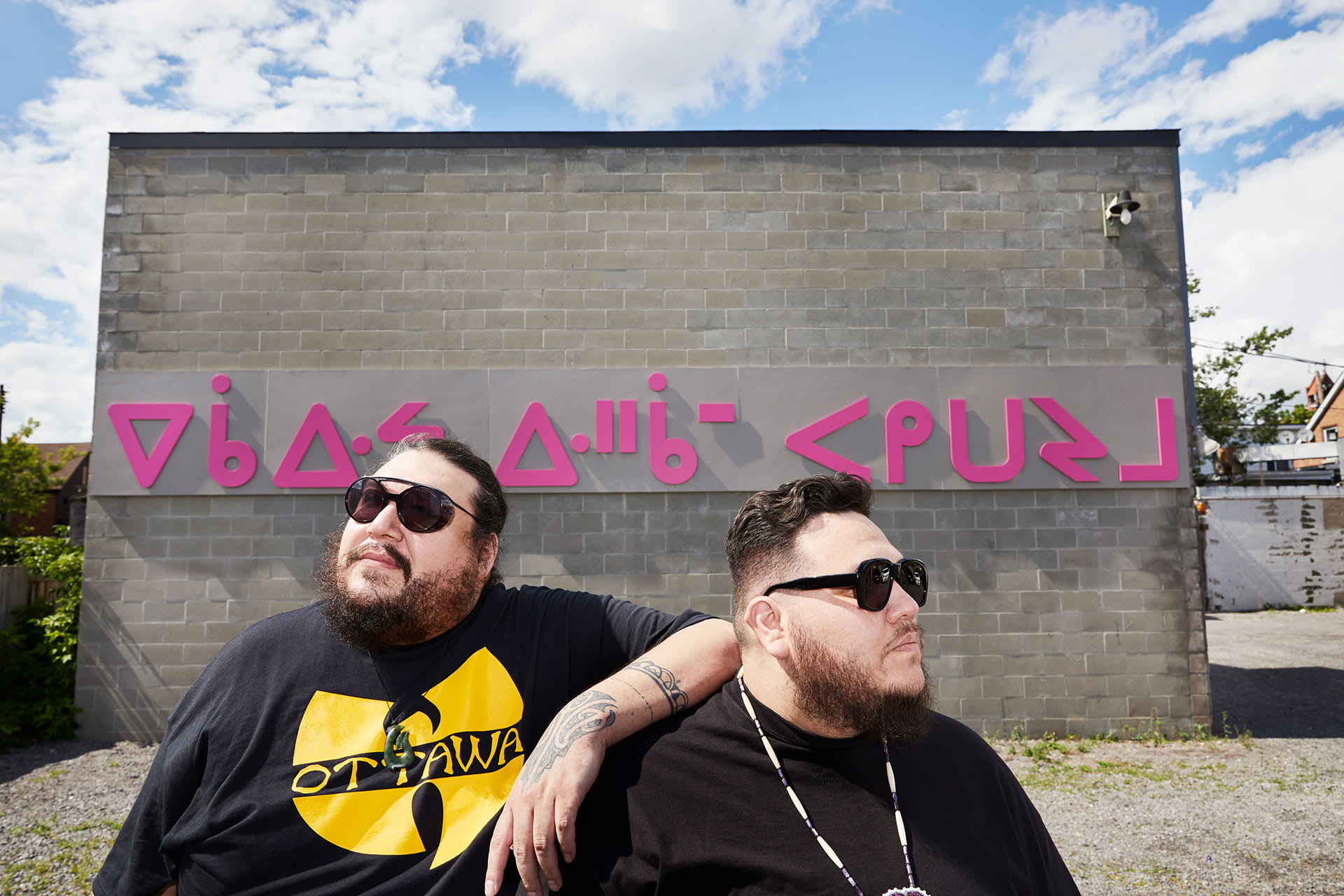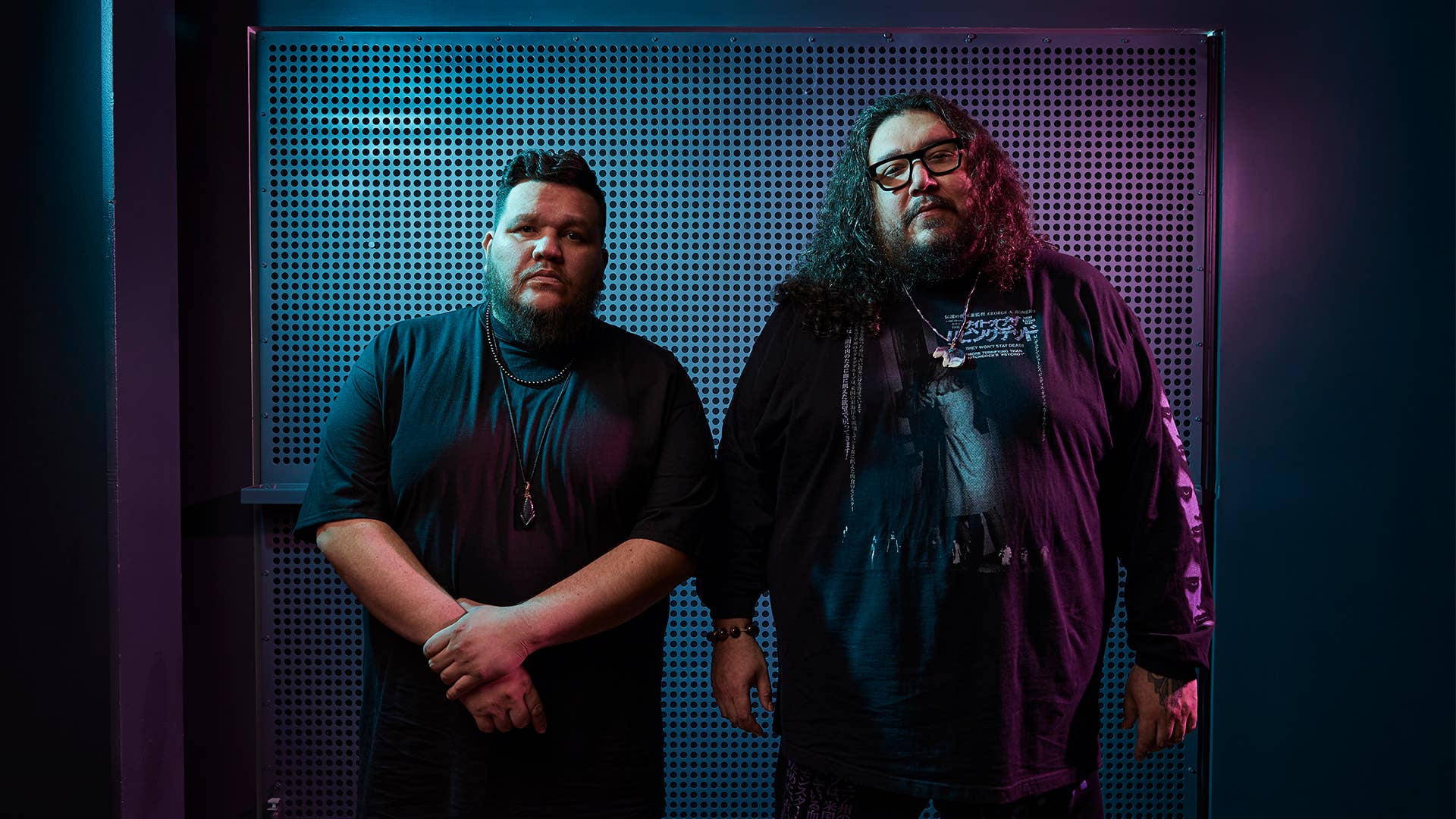
The TONTO synthesizer—which Stevie Wonder and Gil Scott-Heron had broken ground with on their respective LPs Innervisions and 1980—had been out of commission for decades. That is, until The Halluci Nation put powwow vocals through it.
The newly renamed duo—formerly A Tribe Called Red and currently consisting of Indigenous DJs Bear Witness and 2oolman (solidifying as such after a few lineup changes)—had been invited to the National Music Center in Calgary to not only be the first musicians to use the newly restored synthesizer, but also collaborate with none other than TONTO creator Malcolm Cecil. Getting “his approval… gave us confidence. If we can impress a man that’s seen it all and worked with Stevie, then that’s awesome!” says Tim “2oolman” Hill of meeting and working with Cecil in 2018.
Since then, 2oolman and Ehren “Bear Witness” Thomas (the former being Mohawk and latter of the Cayuga First Nation, though they’re both from the Six Nations of the Grand River in Ontario) have further pushed their sound by using modern electronica techniques and software with older analog synthesizers. And while A Tribe Called Red made a name for itself melding powwow vocal samples and dance beats—first with a decade-long party series at Ottawa’s Babylon nightclub, and culminating in a run of albums like Polaris Prize nominees Nation II Nation (2013) and We Are the Halluci Nation (2016)—Bear Witness and 2oolman have upped the ante on their new album by working with live Indigenous drum groups. Out today, that new LP is called One More Saturday Night in dedication to the group’s formative Babylon Electric Pow Wow parties.
Bear Witness and 2oolman spoke to Complex Canada about One More Saturday Night prior to the discovery of hundreds of graves at former Canadian residential schools. They understandably declined to answer follow up questions about that atrocity. Our empowering interview details The Halluci Nation’s groundbreaking sets in Ottawa, the muses for their new LP, the reason why they changed their group name, and their work with influences like Cecil and veteran Indigenous poet John Trudell, along with a more offbeat collaborator: The Office’s Ed Helms.
Tell us about your new single and video, “Remember 01.”
Bear Witness: We’re using this song to give direction to our new album. Much like our last album, We Are the Halluci Nation, which was informed by a poem John Trudell gave us, that poem went on to inform the direction of our careers. That was the reason for the name change, to try and bring John’s words and ideas into our work. [Reporter’s note: Trudell coined the term Halluci Nation, and the group sampled him talking about it on their preceding album, We Are the Halluci Nation, before taking it on as their group name].
When we were thinking about what to do next, we looked back on a video of the first night we met John, when he introduced us onstage before we played. His description of us sounded more like where we are now than at the time, in 2014. It gave us this feeling that John had a plan and a vision and set us on a course, and we’re only just realizing it now. We sampled that speech of his on “Remember 01,” because it was a jumping off point.
Another Saturday Night is not only the name, but also the theme of the new album. We’re looking back at 10-plus years of A Tribe Called Red, and we’re looking to start a new cycle. Before moving on to do something new, we wanted to look back and pay homage to the monthly club nights we did in Ottawa that started Tribe. We were all Native DJs, and we aimed the night at the Indigenous community, which set it apart. The new album is a love letter to that part of our careers. We’re giving attention and love to the people that came to those parties. We wanted to bring back the feeling of those powwow days, but also show we have a new perspective on how we use powwow in our songs.
“I never see myself as an activist. I just do the things I do because I am Indigenous and it is necessary to do these things and talk about them.”
Tell us more about that new perspective.
2oolman: Before, we would sample powwow music that was already released, even before I joined the group. But since then, we’ve been building relationships with and recording with drum groups, and making that part of our mandate. It’s important to collaborate in that kind of way. We still chop and sample older recordings, but moving forward we’re taking any opportunity to collaborate with drum groups, and chop and sample in real time. We’ve sat in as they’ve written hand drum songs, and while I’ve never written one in my life, being part of that process has taught us how much further we can take this thing.
Bear Witness: The technology has changed too, and that’s affected how we can sample and chop things up. The powwow samples feel really different on this new album. We’ve been able to open up our creative process to allow for a wider range of things to happen in the music.
2oolman: But the crazy thing is: we’ve been going back too! We’ve been messing with analog from ’70s. We’re using modern software and techniques to have conversations with old gear, and making it all work. We’re constantly in search of new sounds, and we feel like we’re in a really good position creatively to try different things. We even put Powwow vocals through TONTO at the National Music Center.
Bear Witness: TONTO is a one-of-a-kind modular synth that now lives at the National Music Center in Calgary. Over the years, they restored this legendary piece of gear that has been used by Stevie Wonder and, umm…
2oolman: And Gil Scott-Heron.
Bear Witness: Right! And Funkadelic. All these amazing musicians. And we were fortunate enough to be among the first people to use it after the restoration process was complete. Not only did the National Music Center bring us out, but also TONTO creator Malcolm Cecil. So we could use the machine, and work with one of the people that worked on Innervisions, and Gil’s late ‘70s stuff. Working with Malcolm was not only amazing because he had built this machine, but also because he was this sage level musical mind. So we had a masterclass in sound during the process of recording this album.
2oolman: The moment we got his approval, and him pulling out his phone to watch us working on TONTO, gave us confidence. If we can impress a man that’s seen it all and worked with Stevie, then that’s awesome! We respected each other, and quickly realized we love music in the exact same way. It’s funny because the two of us [gestures at Bear] equals one Cecil. I rep the math side of things when it comes to music and synthesis, and Bear reps the spiritual love that also is very important. We each have both of course. But Malcolm was able to speak to both of us. I used to be a teacher back in the day, and it’s hard to connect like that on all spectrums.

A few moments ago, you said John Trudell [who died in 2015] had a “vision” for the Halluci Nation. What did you mean by that?
Bear Witness: He always topped our list of dream collaborators. He influenced us all. His words and music and politics had been around us all our lives. But we didn’t have a direct connection to him. Later, a mutual friend said John knew about our music and wanted to meet, and we made it happen at the Santa Fe Indian Market. He showed up before our show there and wanted to introduce us onstage.
I wanted to fan out. But he stopped me from blubbering, before I could start. He already knew my name, and told us about how much our music meant to him. He said we had intuitively found our way to something that took him half his life to find: music to amplify your voice and carry it further than it would otherwise go. Though we’ve always been a party group, we’ve also always tried to bring a lot of heavy ideas forward with dance music and visuals at our shows. He saw us as a vehicle to continue the work he was doing.
So the time we spent with him was him downloading ideas to us. From the first day, he pulled poems out of a notebook, and asked if we could do something with them, then started reading them to us. He’d send me spoken word recordings over the phone. He really wanted to pass on knowledge and ideas to us. And the poem that we ended up using wasn’t even the first one he wrote for us—he had written another that really laid out something for us, which we started following unknowingly, subconsciously. It wasn’t until we got to the other end of this, and looked back, that we realized, “Wow, he saw us ending up here, and gave us the words we needed to hear to make this album.”
2oolman: It was the perfect fit for the intro of the album.
Bear Witness: It was about who we need to be to continue the work we’ve done as Tribe. I never see myself as an activist. I just do the things I do because I am Indigenous and it is necessary to do these things and talk about them. I’m always working to represent Indigenous people the way we need to be represented. That’s our work, and he had these words from John that helped us be strong in doing that.
Also: a lot of what he said about us set it up that this isn’t ours, that the spirit of it is bigger than us.
2oolman: We’d traditionally always go back to our elders to get advice, and he’s one of those guys we look to for answers. Our people have long recorded our elders and watched the tapes, so that the younger generation could learn. One More Saturday Night is Bear and I doing that in a different art form.
When you said One More Saturday Night is an homage to Tribe’s early Babylon days, what are some of your fondest memories of those formative sets, Bear?
Bear Witness: It’s hard to break down a club night that ran for 10 years. A lot of big things happened in small moments there. One night in the early days of the party, around 2009, we brought up this Indigenous comedy troupe, the 1491s, to open for us. They work to promote the same values we have in our music, but through comedy. After their set they stayed to hear us play. But at the time we wouldn’t play original music until midnight. They said they had an early flight but I told them: “Soon we’ll play our powwow music. Do you want to see white people dance to it?”
And his face dropped, like it didn’t compute. Because we’re not used to people outside our community acknowledging or enjoying what we do, at least in a manner that’s not offensive. They stayed, and it got crazy. Because everybody came out to our nights at Babylon, it was a very mixed crowd. But the Indigenous people would really rep when the powwow music came on. And I remember one of the guys from the 1491s grabbing me in the middle of 40 people chaos onstage, and he was just having the time of his life. I had no idea what he said to me, it was just one of those inaudible DJ table moments.
That has been something that really carried on into the future for us. That idea of being able to rep ourselves and culture in a way our people love, and that non-Indigenous people could appreciate. Creating that space is something we continued to do outside the clubs, with festival performances around the world.
2oolman: We haven’t just played festivals. During COVID, we played our first drive-in show! [Laughs.] It was cool to get out for the first time during the pandemic. And after playing the show, we went straight to making our new video, “Remember 01.” It was awesome, because we rarely participate in our videos. But we’d been locked down until then, and it was cool to make a cameo and be a bigger part of it.
Bear Witness: This video started long ago with an idea about my love of poster hoarding, and how posters can get tagged up in public over time. It goes back to my dad being a photographer: I had an image in my head of our posters on a wall, and it becoming our album cover. Which is what we ended up doing for One More Saturday Night’s cover.
“Any place where we can have more representation is so important, not only for those artists and their careers, but also the youth who will see those artists getting uplifted.”
Aside from working on your new album and videos, you’ve also kept busy contributing music to the new Ed Helms-starring NBC series Rutherford Falls. What has that been like?
Bear Witness: There’s never been a big network comedy that had an Indigenous showrunner, or as much Indigenous talent both behind and in front of the camera. The showrunner, Sierra Teller Ornelas, asked us to be a part of it. The writers’ room was half Indigenous, and the cast has Indigenous people like Michael Greyeyes. And Gary Farmer, who is from our reservation and is also one of the 1491s, is a writer on the show, and makes and appearance. There are a lot of artists in our general orbit involved in this. It’s amazing to have our work get out to people on that level. Knowing that we are part of something that is elevating the Indigenous profile is so important and exciting.
Did Ed Helms serenade you with his song from The Hangover?
2oolman: [Laughs.] Our friends kept telling us to call Ed Big Tuna. We decided not to. He was actually more hands-on with the music than we expected. And some of our favorite scenes on the show are ones with Ed that we did music for.
When you mentioned being a part of something that raises the profile of Indigenous artists, it reminded me a bit of the recent inaugural International Indigenous Hip Hop Awards. What was it like to see that take place?
2oolman: I’ve worked with Hellnback, and Dreezus, and other Indigenous hip-hop artists. Halluci Nation has been getting away a bit from hip-hop. We’ve worked a lot with Tanya Tagaq, for instance, to expand our sound.
Bear Witness: We’re hip-hop adjacent. It took us two or three trips to Winnipeg before we got people dancing there. [Laughs.] Kidding aside: Winnipeg is such an important city for the Indigenous scene. There’ve been radio stations there for a long time that play Indigenous hip-hop. Think about that: native hip-hop gets airplay in Winnipeg! So, it was no surprise that the awards were happening there. And any place where we can have more representation is so important, not only for those artists and their careers, but also the youth who will see those artists getting uplifted.
Because when we were growing up, we didn’t have people from our communities as successful role models for the rest of the world. There was never a shortage of talent within our communities, but having them seen by the rest of the world is so important now.



